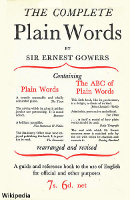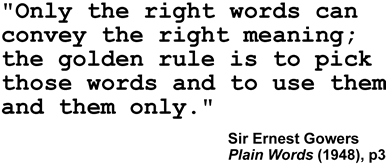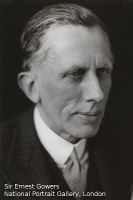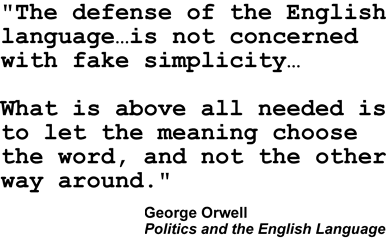Defending Plain English
Arbitrary limits on word and sentence length have no place in Plain English
Plain English needs defending, but the barbarians at the gates are not the reactionaries you'd expect. Rather, they are those well-meaning souls who would improve our writing by imposing arbitrary limits to word and sentence length, as if the language were amenable to such things. If you cling to the notion that writing is more art than arithmetic, don your helmet, grab your mace and read on…
don your helmet, grab your mace and read on…
It was in the early Twentieth Century that one Sir Ernest Gowers (1880-1966), a senior British civil servant, hated the bureaucratic language of government departments so much that he began pushing for reform. However it was not until after World War 2, when he was in retirement, that he got around to writing the booklets that put Plain English on the map: Plain Words (1948), ABC of Plain Words (1951) and The Complete Plain Words (1954). The latter, despite being primarily intended for civil service use, went viral (in a genteel 1950s sort of way) and has been in print ever since. Over the years many have built on Gowers' work, and Plain English movements have sprouted across the world.
Yet the waffle persists.
One reason is the perception that Plain English is as much concerned with replacing big words with little words, and arbitrarily limiting sentence length, as it is with avoiding verbiage. Confident in this belief, some would-be writers adopt the 'short is good' gospel as their guiding light and blithely produce the stilted, imprecise prose that  gives the cause a bad name. Meanwhile, those with a love of the language, who should be Plain English’s greatest supporters, are appalled by this ‘dumbing down’ Plain English stuff and safely retreat to the way they have always written. Is it any wonder Plain English has such a long way to go?
gives the cause a bad name. Meanwhile, those with a love of the language, who should be Plain English’s greatest supporters, are appalled by this ‘dumbing down’ Plain English stuff and safely retreat to the way they have always written. Is it any wonder Plain English has such a long way to go?
At this point some clarification is called for, lest you take my reluctance to condemn ‘big words’ as licence to indulge in your favoured baroque writing style (only joking). Simply put, Plain English uses the best word for the job, whether it be familiar or not, abstract or concrete, short or long. That doesn't mean we shouldn't prefer the concrete over the abstract and so forth; of course we should, but only when dealing with synonyms. These are, however, rare birds; those pairs we call synonyms are usually separated, at least subtly, by tone, nuance or usage,  and to compromise here is to compromise meaning.
and to compromise here is to compromise meaning.
By now you’re probably channelling Gowers to put me in my place. Fear not, I don’t presume to challenge his work, rather I aim to defend it. In his Plain Words, Gowers wrote that 'only the right words can convey the right meaning', and he did so without qualification. Drawing on the work of others (including H.W. Fowler, of Fowler's Modern English Usage), Sir Ernest formulated three rules for writing Plain English (p34). Of the two relevant here, one favours the familiar over the far-fetched, the other precise meaning over the vague. The point is that the two are not mutually exclusive, and Gowers wants you to pick the most familiar word that conveys the desired meaning, precisely, regardless of how long it is.
And that word will be a ‘strong’ one. Strong words are specific. Weak ones are suitable for any occasion, and suitably lacking in meaning. Weak nouns and verbs need the help of adjectives and adverbs to convey the meaning inherent to their stronger brethren. For example, 'big luxury car' conveys less meaning in three words than 'limousine' does in one. And think twice before using generic verbs such as ‘to be’, ‘to have’, ‘to go’, ‘to do’, ‘to make’ and ‘to say’. Use strong words to reduce your word count while increasing the impact of your writing. That’s Plain English.
Gowers was equally disinterested in sentence length; he fought circumlocution, not long sentences. The two may cohabit in the work of the unskilled, but that’s hardly reason to surrender a tool of the trade. Sentences of over 40 words are common in Plain Words, and the very first sentence in George Orwell's defence of the language, Politics and the English language, has 35 words.
Good writers don't use long sentences just for the purpose of conveying meaning, as they know that variation in sentence length is essential to keep the reader’s interest, and that the ‘rhythm’ or mood of the writing often demands a long sentence,  even an especially long one. Just as a short one is often used for contrast.
even an especially long one. Just as a short one is often used for contrast.
And while on the topic of arbitrary limits, let's spare a thought for the passive voice. Granted, the passive is abused so much, and with such ill effect, it’s no wonder we’re told to avoid it. And it’s often used to hide the truth. Nevertheless, the put upon passive has a deserved place in the toolbox. One handy use is to shift emphasis, such as when linking paragraphs or sentences (as it did two sentences back). Just use the passive when it suits – it’s only a problem when used thoughtlessly. Choose with care and you’ll find the active naturally becomes the default.
A writer, like any craftsperson, needs the right tools for the job – you can't afford to lay them aside for the sake of placating those who would lead you astray. Perhaps after reading this you’ll be armed against those barbarians at the gates. If so, you’ll be deaf to their cries and have the confidence to write as you see fit, not by the numbers.

